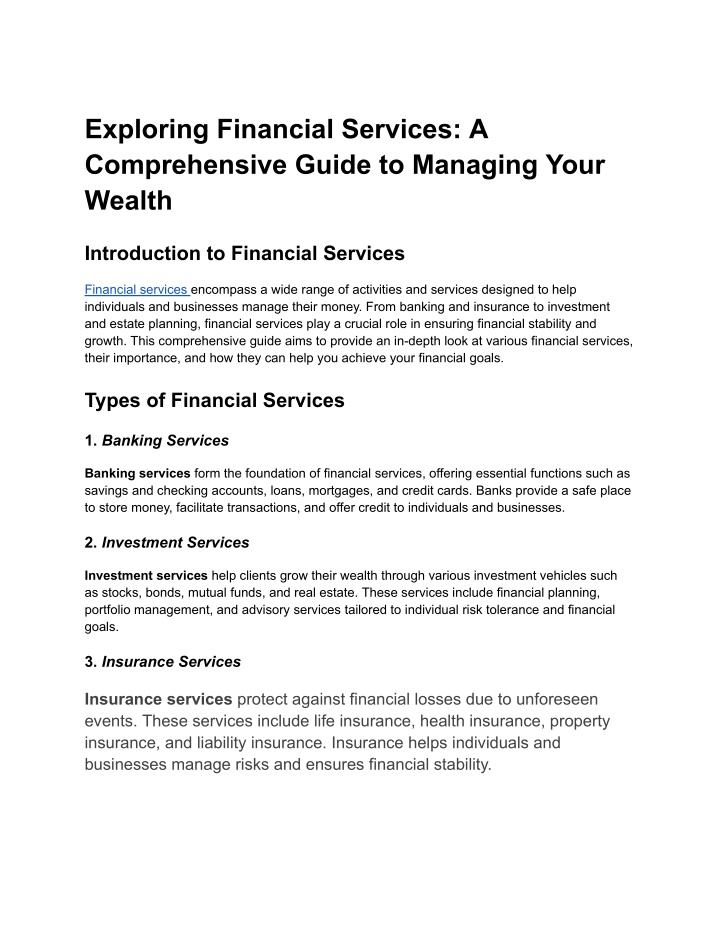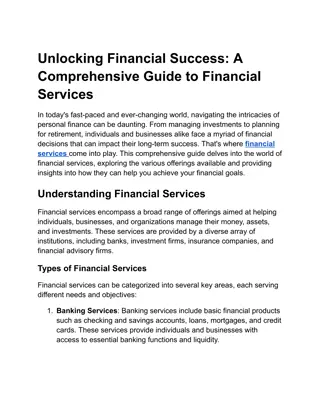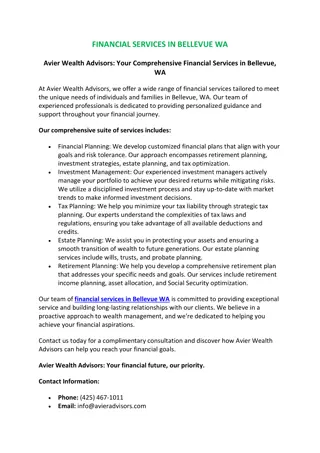
Exploring Financial Services_ A Comprehensive Guide to Managing Your Wealth
Financial services encompass a wide range of activities and services designed to help individuals and businesses manage their money. From banking and insurance to investment and estate planning, financial services play a crucial role in ensuring financial stability and growth. This comprehensive guide aims to provide an in-depth look at various financial services, their importance, and how they can help you achieve your financial goals.
Uploaded on | 15 Views
Download Presentation

Please find below an Image/Link to download the presentation.
The content on the website is provided AS IS for your information and personal use only. It may not be sold, licensed, or shared on other websites without obtaining consent from the author. If you encounter any issues during the download, it is possible that the publisher has removed the file from their server.
You are allowed to download the files provided on this website for personal or commercial use, subject to the condition that they are used lawfully. All files are the property of their respective owners.
The content on the website is provided AS IS for your information and personal use only. It may not be sold, licensed, or shared on other websites without obtaining consent from the author.
E N D
Presentation Transcript
Exploring Financial Services: A Comprehensive Guide to Managing Your Wealth Introduction to Financial Services Financial services encompass a wide range of activities and services designed to help individuals and businesses manage their money. From banking and insurance to investment and estate planning, financial services play a crucial role in ensuring financial stability and growth. This comprehensive guide aims to provide an in-depth look at various financial services, their importance, and how they can help you achieve your financial goals. Types of Financial Services 1. Banking Services Banking services form the foundation of financial services, offering essential functions such as savings and checking accounts, loans, mortgages, and credit cards. Banks provide a safe place to store money, facilitate transactions, and offer credit to individuals and businesses. 2. Investment Services Investment services help clients grow their wealth through various investment vehicles such as stocks, bonds, mutual funds, and real estate. These services include financial planning, portfolio management, and advisory services tailored to individual risk tolerance and financial goals. 3. Insurance Services Insurance services protect against financial losses due to unforeseen events. These services include life insurance, health insurance, property insurance, and liability insurance. Insurance helps individuals and businesses manage risks and ensures financial stability.
4. Retirement Planning Retirement planning services assist individuals in preparing for a financially secure retirement. This includes advice on retirement accounts like 401(k)s and IRAs, investment strategies, and income planning to ensure a steady stream of funds during retirement years. 5. Estate Planning Estate planning involves arranging the management and disposal of a person's estate during their life and after death. Services include creating wills, trusts, and other legal documents to ensure assets are distributed according to the individual's wishes and to minimize estate taxes. 6. Tax Planning and Advisory Tax planning and advisory services help individuals and businesses minimize their tax liabilities and comply with tax regulations. This includes strategies for tax-efficient investments, deductions, and credits, as well as preparation and filing of tax returns. 7. Wealth Management Wealth management services provide a holistic approach to managing an individual's finances. This includes investment management, financial planning, tax services, estate planning, and more. Wealth managers work closely with clients to develop comprehensive strategies to grow and protect their wealth. 8. Credit and Lending Services Credit and lending services offer various forms of credit, including personal loans, business loans, mortgages, and lines of credit. These services help individuals and businesses finance purchases, expand operations, and manage cash flow. Benefits of Financial Services 1. Financial Stability Financial services provide the tools and expertise needed to achieve financial stability. Whether it's through savings accounts, insurance policies, or investment strategies, these services help individuals and businesses manage their finances effectively. 2. Risk Management Through insurance and diversified investment portfolios, financial services help manage and mitigate risks. This ensures that clients are protected against unexpected financial setbacks.
3. Wealth Growth Investment and wealth management services are designed to grow wealth over time. By leveraging various investment opportunities and strategies, clients can achieve their financial goals and build a secure financial future. 4. Expert Guidance Financial advisors and planners offer expert guidance tailored to individual needs. Their expertise helps clients make informed decisions, optimize their financial strategies, and navigate complex financial landscapes. 5. Time Savings Managing finances can be time-consuming and complex. Financial services streamline these processes, allowing clients to focus on other important aspects of their lives and businesses. 6. Comprehensive Planning Financial services offer comprehensive planning that covers all aspects of an individual's or business's financial life. This holistic approach ensures that all financial decisions are aligned with overall goals and objectives. Choosing the Right Financial Services Provider 1. Reputation and Credibility When selecting a financial services provider, consider their reputation and credibility. Look for providers with a track record of reliability, integrity, and positive client testimonials. 2. Range of Services Choose a provider that offers a comprehensive range of services tailored to your specific needs. This ensures that all aspects of your financial life are managed effectively and cohesively. 3. Expertise and Experience Evaluate the expertise and experience of the provider's team. Certified professionals with extensive experience in financial planning, investment management, and other relevant areas are essential for high-quality service.
4. Fee Structure Understand the fee structure of the financial services provider. Ensure that fees are transparent and reasonable, and that they align with the value of the services provided. 5. Personalized Approach Select a provider that offers a personalized approach to financial planning and management. They should take the time to understand your unique financial situation, goals, and risk tolerance to provide tailored advice and solutions. Advanced Tips for Utilizing Financial Services 1. Regular Reviews and Updates Regularly review and update your financial plans to reflect changes in your life circumstances, financial goals, and market conditions. This ensures that your strategies remain relevant and effective. 2. Diversification Diversify your investments across different asset classes, sectors, and geographic regions to manage risk and enhance potential returns. A well-diversified portfolio can help protect against market volatility. 3. Stay Informed Stay informed about financial markets, tax laws, and economic trends. While your financial advisor provides expert guidance, having a basic understanding of these factors helps you make informed decisions. 4. Plan for the Long Term Focus on long-term financial goals and avoid making impulsive decisions based on short-term market fluctuations. A long-term perspective helps you stay disciplined and achieve sustainable financial growth. 5. Utilize Technology Leverage financial technology tools and platforms offered by your provider. These tools can help you track your investments, monitor your financial health, and make informed decisions.
Conclusion Financial services are integral to achieving financial stability, growth, and security. By leveraging the expertise and resources of financial services providers, individuals and businesses can navigate the complexities of financial management and reach their goals. Choosing the right provider involves careful consideration of their reputation, range of services, expertise, and personalized approach. With the right financial services partner, you can confidently manage your wealth and secure a prosperous future. vvvExploring Financial Services: A Comprehensive Guide to Managing Your Wealth Introduction to Financial Services Financial services encompass a wide range of activities and services designed to help individuals and businesses manage their money. From banking and insurance to investment and estate planning, financial services play a crucial role in ensuring financial stability and growth. This comprehensive guide aims to provide an in-depth look at various financial services, their importance, and how they can help you achieve your financial goals. Types of Financial Services **1. *Banking Services* Banking services form the foundation of financial services, offering essential functions such as savings and checking accounts, loans, mortgages, and credit cards. Banks provide a safe place to store money, facilitate transactions, and offer credit to individuals and businesses. **2. *Investment Services* Investment services help clients grow their wealth through various investment vehicles such as stocks, bonds, mutual funds, and real estate. These services include financial planning, portfolio management, and advisory services tailored to individual risk tolerance and financial goals. **3. *Insurance Services* Insurance services protect against financial losses due to unforeseen events. These services include life insurance, health insurance, property insurance, and liability insurance. Insurance helps individuals and businesses manage risks and ensures financial stability. **4. *Retirement Planning* Retirement planning services assist individuals in preparing for a financially secure retirement. This includes advice on retirement accounts like 401(k)s and IRAs, investment strategies, and income planning to ensure a steady stream of funds during retirement years.
**5. *Estate Planning* Estate planning involves arranging the management and disposal of a person's estate during their life and after death. Services include creating wills, trusts, and other legal documents to ensure assets are distributed according to the individual's wishes and to minimize estate taxes. **6. *Tax Planning and Advisory* Tax planning and advisory services help individuals and businesses minimize their tax liabilities and comply with tax regulations. This includes strategies for tax-efficient investments, deductions, and credits, as well as preparation and filing of tax returns. **7. *Wealth Management* Wealth management services provide a holistic approach to managing an individual's finances. This includes investment management, financial planning, tax services, estate planning, and more. Wealth managers work closely with clients to develop comprehensive strategies to grow and protect their wealth. **8. *Credit and Lending Services* Credit and lending services offer various forms of credit, including personal loans, business loans, mortgages, and lines of credit. These services help individuals and businesses finance purchases, expand operations, and manage cash flow. Benefits of Financial Services **1. *Financial Stability* Financial services provide the tools and expertise needed to achieve financial stability. Whether it's through savings accounts, insurance policies, or investment strategies, these services help individuals and businesses manage their finances effectively. **2. *Risk Management* Through insurance and diversified investment portfolios, financial services help manage and mitigate risks. This ensures that clients are protected against unexpected financial setbacks. **3. *Wealth Growth* Investment and wealth management services are designed to grow wealth over time. By leveraging various investment opportunities and strategies, clients can achieve their financial goals and build a secure financial future.
**4. *Expert Guidance* Financial advisors and planners offer expert guidance tailored to individual needs. Their expertise helps clients make informed decisions, optimize their financial strategies, and navigate complex financial landscapes. **5. *Time Savings* Managing finances can be time-consuming and complex. Financial services streamline these processes, allowing clients to focus on other important aspects of their lives and businesses. **6. *Comprehensive Planning* Financial services offer comprehensive planning that covers all aspects of an individual's or business's financial life. This holistic approach ensures that all financial decisions are aligned with overall goals and objectives. Choosing the Right Financial Services Provider **1. *Reputation and Credibility* When selecting a financial services provider, consider their reputation and credibility. Look for providers with a track record of reliability, integrity, and positive client testimonials. **2. *Range of Services* Choose a provider that offers a comprehensive range of services tailored to your specific needs. This ensures that all aspects of your financial life are managed effectively and cohesively. **3. *Expertise and Experience* Evaluate the expertise and experience of the provider's team. Certified professionals with extensive experience in financial planning, investment management, and other relevant areas are essential for high-quality service. **4. *Fee Structure* Understand the fee structure of the financial services provider. Ensure that fees are transparent and reasonable, and that they align with the value of the services provided. **5. *Personalized Approach*
Select a provider that offers a personalized approach to financial planning and management. They should take the time to understand your unique financial situation, goals, and risk tolerance to provide tailored advice and solutions. Advanced Tips for Utilizing Financial Services **1. *Regular Reviews and Updates* Regularly review and update your financial plans to reflect changes in your life circumstances, financial goals, and market conditions. This ensures that your strategies remain relevant and effective. **2. *Diversification* Diversify your investments across different asset classes, sectors, and geographic regions to manage risk and enhance potential returns. A well-diversified portfolio can help protect against market volatility. **3. *Stay Informed* Stay informed about financial markets, tax laws, and economic trends. While your financial advisor provides expert guidance, having a basic understanding of these factors helps you make informed decisions. **4. *Plan for the Long Term* Focus on long-term financial goals and avoid making impulsive decisions based on short-term market fluctuations. A long-term perspective helps you stay disciplined and achieve sustainable financial growth. **5. *Utilize Technology* Leverage financial technology tools and platforms offered by your provider. These tools can help you track your investments, monitor your financial health, and make informed decisions. Conclusion Financial services are integral to achieving financial stability, growth, and security. By leveraging the expertise and resources of financial services providers, individuals and businesses can navigate the complexities of financial management and reach their goals. Choosing the right provider involves careful consideration of their reputation, range of services, expertise, and personalized approach. With the right financial services partner, you can confidently manage your wealth and secure a prosperous future.






















